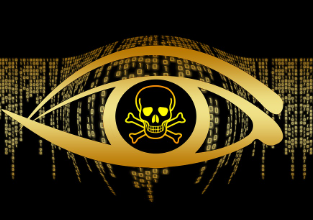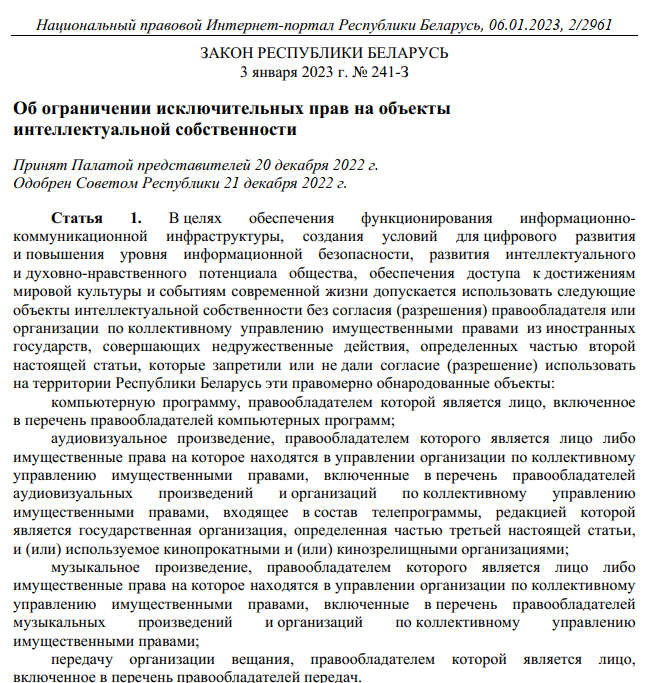House > law and politics >
Belarusian dictator Aleksandr Lukashenko has signed a new law legalizing piracy of movies, music, TV shows and rights-holder-owned software from “unfriendly countries.” The law also permits the importation of goods protected by intellectual property laws from any country without the permission of the rights holder.
 In 1994, Belarus’ new constitution led to democratic presidential elections and the emergence of Alexander Lukashenko as the country’s leader.
In 1994, Belarus’ new constitution led to democratic presidential elections and the emergence of Alexander Lukashenko as the country’s leader.
Lukashenko remains in power today thanks to a series of landslide “victories” of elections, similar results in a referendum to remove presidential term limits, and the endorsement of Russian leader Vladimir Putin.
In 2021, Lukashenko ordered the hijacking of Ryanair Flight 4978. The US responded by indicting Belarusian officials for aircraft piracy. The Belarusian dictator now has another kind of piracy in mind that will lead to further isolation on the world stage.
Belarus needs access to foreign IPs
Lukashenko’s support for Russia’s invasion of Ukraine has led to new sanctions by the US, EU, UK and other countries.
Like Russia, Belarus relies on intellectual property owned by foreign rights holders who are currently unable or unwilling to provide and/or license it.Therefore, to ensure legal To prevent access to pirated movies, music, TV shows and software, the government has drafted new laws restricting intellectual property rights.
Adopted by the State Duma (lower house) on December 20, 2022, and one day later by the Council of the Republic (upper house), Lukashenko signed its articles into law on January 3, 2023.
New law legalizes audiovisual piracy
law “Restrictions on Exclusive Rights to Intellectual Property Objects” Intended for collectively managed licensing organizations representing rights holders or multiple rights holders.
If these are from foreign countries that are “acting unfriendly” against Belarus and “prohibited or did not consent” to legally published items of intellectual property used in Belarus , exclusive rights relating to certain product classes are limited.
In this case, the use of the content in Belarus does not require the permission of the rights holder.

The law specifies computer programs and audiovisual works such as movies, music and television programs. The document states that film distributors, film organizations, and broadcasters are subject to the law, suggesting that first screening films and live TV channels are also affected.
Belarus is a signatory to several major intellectual property treaties administered by the World Intellectual Property Organization. We do not have a reputation for responding to state-sanctioned copyright infringement.
Anyone using unlicensed content must pay for it
The new law, which effectively disposes of the exclusive rights of affected people, states that if people/entities use unlicensed/pirated content, rewards will be paid directly to a bank account run by the state-owned National Patent Office. says it must.
Funds transferred to these accounts are held for three years from the credit date and can be legally claimed by the rights holder. If they don’t, Belarus will keep their money.
“After three years, any remuneration not claimed by a rights owner or organization for collective control of property rights will be transferred by the Patent Office to the Republican budget within three months,” the text reads.
Small print…..
Stripping copyright holders of all but the right to be paid may sound like a “better than nothing” deal, but it’s not the case that foreign rights holders actually get paid. assuming you receive it.
Under this new regime, rights holders appear to be denied the right to determine the market price of their content. Instead, the lower house of the Belarusian parliament determines the market price based on unknown factors.
Even assuming those who use foreign content declare their use to the government, Belarus says right holders must reimburse the patent authority for its administrative and accounting costs. You shouldn’t deduct “more than 20%” from it, but given that authorities can use those deductions however they please, there is certainly an incentive to take more than less.
But if Belarus charged the full market price for movies, music and software and managed the scheme for free, would that be enough for copyright holders?
As mentioned earlier, right holders must seek money from patent authorities. Also, according to the Belarusian National Intellectual Property Center, the Patent Office is banked at the Belarusian Bank in Minsk. The government owns 99% of his bank and both are subject to sanctions.
Parallel import goods
Another feature of the new law is to create conditions for increasing the internal stability of the economy and to prevent or reduce serious shortages of food and other products on the domestic market. Permits parallel imports.
If these parallel imports contain material protected by intellectual property law, the rights holder’s permission is not required. This applies equally to “unfriendly” and friendly nations, but be careful.
When rights holders of “friendly countries” cooperate with Belarus, the law stipulates that their rights will be deprived only “if there is a serious shortage of these goods on the domestic market.”
law (pdf) It goes into effect this week and is valid until December 31, 2024.

